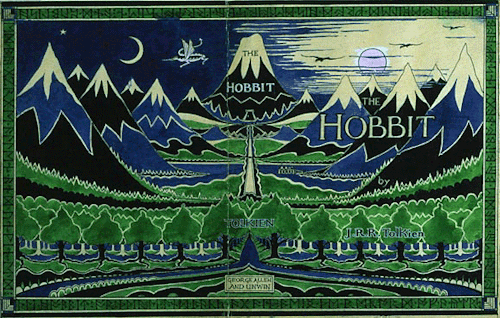Recently on Facebook there’s been a
game to “Name fifteen books you've
read that will always stick with you. List the first fifteen you can
recall in no more than fifteen minutes. ”
It’s morbid of me, but I don’t
believe any book will stick with me forever. I phone my grandfather every night.
With his age, he suffers from dementia and can’t name two books he’s ever read.
The other night he tried to ask how my kids are – and folks, I don’t have any.
However, there are books that stick
around for the long haul. There are books with long-term influence on behavior
or how we write. Just like when the Fifteen
Authors game was in vogue last year, though, I think it’s shameful to not
write some of why these books stick with you. So while I made the list in
fifteen minutes, I spent a few more writing just why they’re listed. Going to use
this noodle while I’ve got it.
Here we go.
1.
J.R.R. Tolkien's The Hobbit
It’s my entry point into the fantastic. The archetypes of Bilbo, Gandalf
and Smaug are dug pretty deep into my artistic psyche. The adventure, the
convenience of invisibility, the force into so many kinds of bravery and
ingenuity – ah, it’s just neat stuff. Also, The Hobbit sticks with me because
no matter how I study it, I cannot figure out why as a kid I thought Beorn was
black.
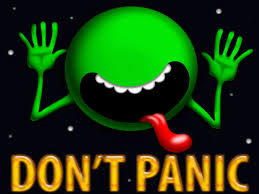 2. Douglas
Adams's Hitchhiker's
2. Douglas
Adams's Hitchhiker's
Guide to the Galaxy
My father was pleased that I liked it, but looked dismayed when I said how
good it was the Science Fiction could be fun. No, I didn’t mean “funny.” It was
the first SciFi I ever encountered that didn’t take itself so seriously that it
failed to entertain, and it remains one of the cleverest novels I’ve ever read.
Oftentimes I reflect on it as the end of the spectrum, where all goofy
Speculative Fiction ideas race to the edge of visibility.

3. G.K.
Chesterton's The Man Who Was Thursday
Part was reading it so long after its publication. Time has certainly
helped the satirical novel’s opinions age and become more pliable than
originally intended. That initial reading made it a damning satire, but also a
damnably effective satire of satire itself. Religion is defended, but also
excoriated. Anarchism is embraced, but by morons. Especially after
Hitchhiker’s Guide, it’s a stirring
reminder not to leave any side standing in humor.

4. Jim
Starlin's Infinity Gauntlet
At least one comic book would be on here. At several junctures in my
ADD-addled childhood, they got me to sit down and read at all. This one
introduces Thanos, probably my all-time favorite villain. It’s rare that a god doubles
as a mad scientist, and rarer that either of those is a hopeless, cuckolded
romantic. There’s a Mary Sue quality to his rise to power and eradicating so
many iconic heroes, but there’s also a Hamlet quality to how he loses it. And
who doesn’t want an Infinity Gauntlet?

5. Mark
Twain's The Adventures of Tom Sawyer
One of the first novels I ever re-read, and one that I re-read as a
bedridden teenager. Divorced from social interaction, I misinterpreted Tom’s romantic
values, which Twain meant to be skewering satire, for earnest instruction and
tried to live by them when I started walking again. I got made fun of a lot.
The comedy of errors I lived out for a few years as I weeded this stuff out of
my head has always stuck with me.
6. Mark
Twain's The Diaries of Adam and Eve
Hard not to go back to Twain. I read this one later in life, in a collected
edition. It’s disappointingly funny – disappointing in that very little comedy can
hereafter be written about the tensions between the sexes without seeming pat. That
he disarmed with anarchic humor to mount some deep emotional catharsis about
attachment and loss has helped it stick around in my head.

7. The Book
of Job
I actually got offended when a friend told me she wasn’t surprised this was
my favorite part of The Bible. Sure, life has kneecapped me a few times, but
come on! Yet, it is one of humanity’s greatest hits. It was also one of the
biggest hype-bubbles my non-academic ever burst, as it’s not about blind devotion
to God, but about how people rush into inaccurate judgment of each other,
especially in bad times. It’s a literary and theological kick in the ass that
most people need twice-daily.

8. Stephen
King's Needful Things
The first of the King novels stuck with me, following a familiar theme in
his work. This time it was Mr. Gaunt as the creeping, supernatural thing in
civil guise, joining, linking and sinking his teeth into the way we live. One
of the sickest things Horror can do is point out how ignorant quotidian life makes
us to dangers. Making those dangers abstract or fantastical can deepen things.
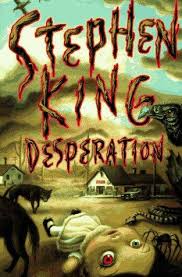
9. Stephen
King's Desperation
My favorite of the King novels. There is guts, of course, with the blatant
relationship to the Bachman book The Regulators, and that stands out for humor.
But there’s also god against god – the hands-on against the hands-off, both
tormenting us mortals in some ways, sure, but the difference between them is so
much more provocative and thoughtful than I’ve seen in any modern novel that
grapples with gods. It’s lucky that it all plays out over some crazy
set-pieces: the heart-wrenching story of the boy hit by the car, and the family
that gets locked up by a mad police officer, and that poor bastard who gets
eaten in the bathroom. All that scenery stuck with me too, because it
showed the benefits of delivering the goods while feeling out your themes.
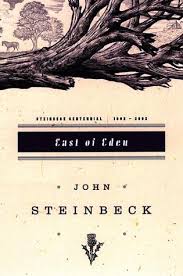
10. John
Steinbeck's East of Eden
I wonder how many people list this one, of all the Steinbeck books? I’d
guess Of Mice and Men and Grapes of Wrath lap it. And those are compelling
works, but the primal explosion of the Cain and Abel archetypes is so
interesting. It’s almost a blueprint for how you should appropriate someone
else’s work, with homage and obvious familiarity, but not leaning on it so
heavily that your authenticity disappears. This whole novel is authentic
Steinbeck in its tragic psychology.
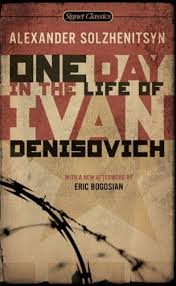 11.
Aleksandhr Solzhenisyn's One Day in the Life of Ivan Denisovich
11.
Aleksandhr Solzhenisyn's One Day in the Life of Ivan Denisovich
If we talk about bleak fiction, chances are I’ll think of this. As a
general and poor rule, I dislike bleak fiction, for especially in the Literary
variety, it leads to masturbatory and uninteresting work.
A Day in the Life
of Ivan Denisovich is neither of those things, nor is it about heroism or a
great escape, nor is it so mired in social commentary that it chokes on opinion
like 1984. It’s just a day in a
miserable life that too many people were forced to live, and through Denisovich’s
experience in the gulag, is a veritable model for how not to break under the
weight.

12. Shirley
Jackson's We Have Always Lived in the Castle
Perhaps the finest book of dialogue I’ve ever read. I still can’t pull of
those voices – the plethora that doesn’t need to be marked or divided, each of
which is so readily identifiable by vocabulary, topic and coherence. It is
brightly and darkly funny, sad and hopeful, and damn it, that ending is better
than anything I’d expected.

13. Gail
Simone's Deadpool
One more comic book. Like M*A*S*H and Lupin the 3rd, it
sticks with me because she assembled such an endearing cast with so many
opportunities for modular dynamics. I could read about the fake cowgirl and the
crappy hitman and the failed superhero who wears a tuxedo over his costume
forever. A shame sales didn’t hold out for this or
Agent X. I feel good when I read her missing that cast, too.
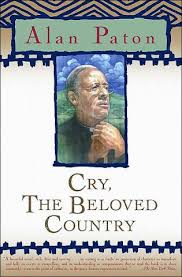 14. Alan
Paton's Cry the Beloved Country
14. Alan
Paton's Cry the Beloved Country
I’d wanted a book like this for years. It’s a novel about a nation at
unrest with its past and its future, where virtually everyone is guilty. The
citizens, the voters, Europeans, natives of all colors, rising political
figures, judges – and rather than assaulting them for their failures, it’s
compassionate in its descriptions of the ways they can fail. There’s optimism
in some of it, obviously, but the holistic approach to why problems are so
endemic is too rare.
 15. Homer's
Iliad
15. Homer's
Iliad
In a little corner of John
Wiswell’s mind is the desire that every novel actually be this: dudes beating
the crap out of each other until the biggest dudes butt heads, and then the end.
It’s gorgeous in every translation I’ve ever read, and the theme of the rest of
the world’s experiences being woven in by metaphor to express what war is
fought for is among the greatest feats in literary history. But I know me. Ajax is such a hoss.
So there are my fifteen. Any surprises for you? If you decide to play this game and write up why the books stick with you, please link me up in the comments. I'm curious why fiction sticks with you.


